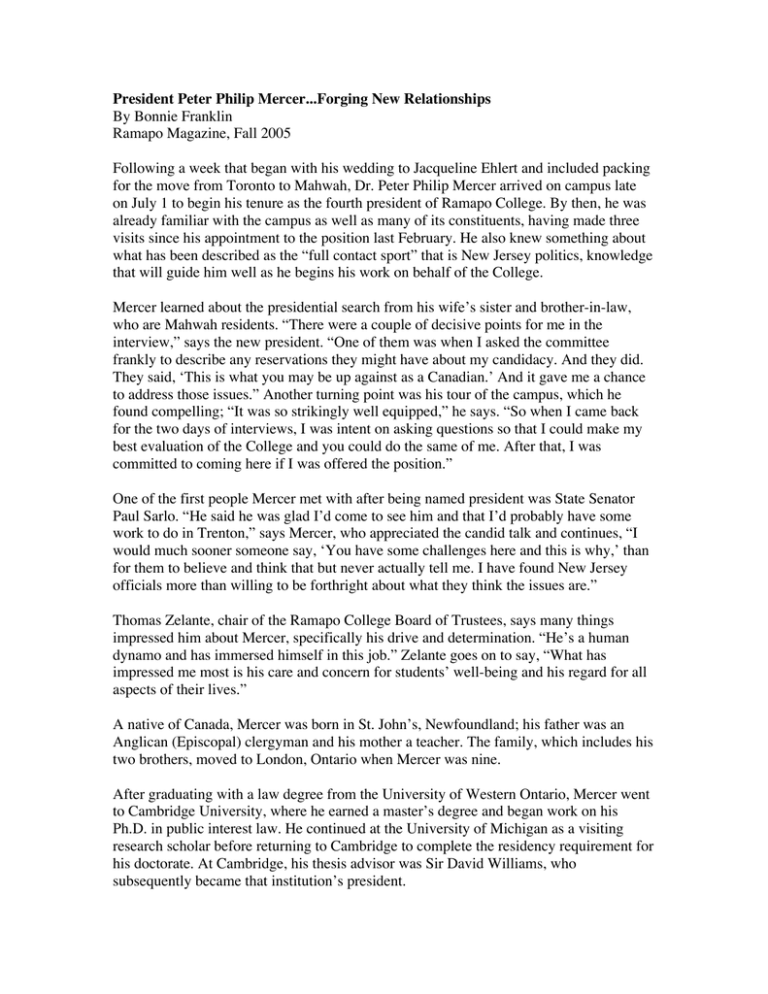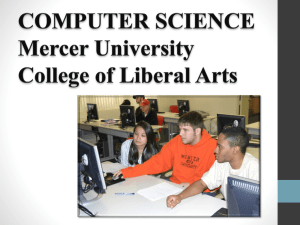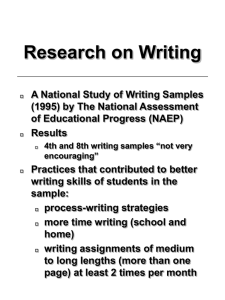President Peter Philip Mercer...Forging New Relationships By Bonnie Franklin
advertisement

President Peter Philip Mercer...Forging New Relationships By Bonnie Franklin Ramapo Magazine, Fall 2005 Following a week that began with his wedding to Jacqueline Ehlert and included packing for the move from Toronto to Mahwah, Dr. Peter Philip Mercer arrived on campus late on July 1 to begin his tenure as the fourth president of Ramapo College. By then, he was already familiar with the campus as well as many of its constituents, having made three visits since his appointment to the position last February. He also knew something about what has been described as the “full contact sport” that is New Jersey politics, knowledge that will guide him well as he begins his work on behalf of the College. Mercer learned about the presidential search from his wife’s sister and brother-in-law, who are Mahwah residents. “There were a couple of decisive points for me in the interview,” says the new president. “One of them was when I asked the committee frankly to describe any reservations they might have about my candidacy. And they did. They said, ‘This is what you may be up against as a Canadian.’ And it gave me a chance to address those issues.” Another turning point was his tour of the campus, which he found compelling; “It was so strikingly well equipped,” he says. “So when I came back for the two days of interviews, I was intent on asking questions so that I could make my best evaluation of the College and you could do the same of me. After that, I was committed to coming here if I was offered the position.” One of the first people Mercer met with after being named president was State Senator Paul Sarlo. “He said he was glad I’d come to see him and that I’d probably have some work to do in Trenton,” says Mercer, who appreciated the candid talk and continues, “I would much sooner someone say, ‘You have some challenges here and this is why,’ than for them to believe and think that but never actually tell me. I have found New Jersey officials more than willing to be forthright about what they think the issues are.” Thomas Zelante, chair of the Ramapo College Board of Trustees, says many things impressed him about Mercer, specifically his drive and determination. “He’s a human dynamo and has immersed himself in this job.” Zelante goes on to say, “What has impressed me most is his care and concern for students’ well-being and his regard for all aspects of their lives.” A native of Canada, Mercer was born in St. John’s, Newfoundland; his father was an Anglican (Episcopal) clergyman and his mother a teacher. The family, which includes his two brothers, moved to London, Ontario when Mercer was nine. After graduating with a law degree from the University of Western Ontario, Mercer went to Cambridge University, where he earned a master’s degree and began work on his Ph.D. in public interest law. He continued at the University of Michigan as a visiting research scholar before returning to Cambridge to complete the residency requirement for his doctorate. At Cambridge, his thesis advisor was Sir David Williams, who subsequently became that institution’s president. He served as an assistant professor of law at the University of Windsor and associate professor of law at the University of Calgary before accepting a position as associate professor with tenure at the University of Western Ontario, where he was immediately offered the associate dean (academic) position. There he went on to become dean and vice president for external affairs, and eventually vice president for administration and general counsel. Mercer is the father of two, a 21-year-old son in his senior year at the University of Toronto, and a 16-year-old daughter in her senior year of high school. Challenges and Opportunities Mercer notes that the statewide college/university capacity problem is very real. “In the past, we’ve identified our likely cap as being at 6,000. We’re not there yet so it gives us some room to grow. We have to identify ways we can be responsive to the need the state has to increase capacity. I wouldn’t want to say at this stage that I’d rethink that 6,000 figure because I don’t have enough information yet, but I certainly want to look at it, because even if we can offer a few hundred more places than we thought, as long as we can maintain our essential character as a premier liberal arts college, then we should look at all those issues afresh.” When asked about rising tuition, Mercer says, “I start by asking, what value are we delivering? And what key performance indicators do we have to demonstrate that? The state appropriations as a percentage of the operating revenues of the College have fallen quite dramatically over the last few years. And that’s not unique to New Jersey; it’s not unique to America. The greatest challenge is to convince students, parents, the public at large, and legislators that public investment in higher education is the best use of public money — the best use of private money, too. A well-educated populace is healthier, more productive, has higher morale, and is more cohesive. A few generations ago it wasn’t hard to make that argument; people looked at education to really advance society. Education is the single greatest force for positive social change as well as positive individuals. It’s what transforms lives. And so the challenge is moving that up the agenda and keeping it there.” Mercer adds that he is willing to press for funding, public and private, “because part of this College’s mission is also to reach out to communities where there are able students who can’t afford the tuition. We need to continue to create buffers to enable those students to attend here. I made it very clear during the interview process that I wanted to make that one of my goals — to rededicate to that mission of being a public college.” Bernard Milano, chairman of the Ramapo College Foundation Board, says he is impressed with how quickly Mercer has made good on that promise and adds, “Peter has shown great interest in meeting and getting to know our corporate, individual, and foundation partners. Expanding these relationships will bring opportunities for current students and enable us to reach out to underserved communities. I’m pleased that he shares my commitment to building the endowment as a means of ensuring our ability to provide excellence that is affordable.” Consistent with previous Ramapo presidents, Mercer strongly supports the College’s liberal arts mission. “There is a need for first-rate colleges. I’m not particularly wowed by the name university or the feeling that somehow you are seen to have progressed if you’ve changed your status or title from college to a university. I think quite differently, that you must be good at what you do. This College’s success has been predicated on becoming better at what it does, not on trying to be all things to all people.” Relating to Ramapo’s Founding “We have a remarkable constituency of faculty here who are founding mothers and fathers, people who were here from the beginning,” Mercer says. “They had a very strong vision of what the College would become and in most important respects, they’ve been vindicated in that the College has done marvelously within the context of their vision. In other respects, I’m sure they feel things have developed differently than they anticipated; that would almost be inevitable. And we have a newer cohort of faculty whose acculturation may be different. When I talk about the renewal of the vision of the College and renewal of the strategic plan, I’m partly talking about making sure that we maintain fidelity to the fundamental principles of the College while sensibly translating what that means in 2005. The founders are guardians of the public trust. And when they have spoken to me, I’ve heard passion, commitment, identification, intensity, and genuine feeling. I hope that the person we hire tomorrow and the person who was here when the college was founded will both say in five years, ‘We’re in a great spot.’” Noting that Ramapo wasn’t originally envisioned as a residential institution, Mercer adds that its transition to one has had “profound and wonderful implications. You look at the retention rate, the number of students who come back after the third year - the percentage has risen in the last four years from 66 to 74. That’s striking. If good students are educated here, the chances that they will maintain ties to New Jersey are much greater.” Priorities and the Future “My own immediately identifiable goal,” says Mercer, “would be to continue to increase the academic standards of the College, while also increasing its diversity. “I have to reach out myself. I need to be seen as a visible embodiment of the commitment, probably in places where presidents might not have been before, in situations presidents might not have been before. It’s important for those who live and work here to be in a diverse environment. That’s part of their education; that’s part of our social responsibility.” In Mercer’s view, the College is moving toward what he describes as a new level of complexity. For examples, he points to faculty with well-developed research programs and those who are reaching out to industry, government and to other institutions, and to the College’s richer, more complex programmatic elements. He explains, “I think that is going to grow even further. The opportunities the students will have, the very diverse experiences, are going to expand. I think the change that I’m capable of leading will be to ensure that the infrastructure that develops in the College supports that.” Mercer sums up by saying, “Ramapo is on the radar screen of people who in the past would not have thought of it as an option, either for themselves or their children. That’s a real testament to the people here. This College has been very well run, and very imaginatively run. I think it probably took some risks, programmatically, in the early days that now are paying off.” He continues, “But, there are constituencies that we need to spend more time communicating with. One of my priorities is to make sure that we are known to our representatives, to those who make decisions in Trenton, so that we can help influence those decisions, and I don’t mean that entirely parochially. It’s not just, ‘what can we get out of it?’ but ‘what can we do for the system of higher education in New Jersey?’ We’ve got a very credible voice to lend to that debate.” New Residents in the Havemeyer House Peter and Jacqueline Ehlert-Mercer met at a food services conference in June 2002 where he was a featured speaker. Jackie, a registered dietician with her own business and a former director of food services at a college in Vancouver, asked Peter if she could quote from his speech for an article she was writing. The Mercers were married June 25, 2005. “I’m enormously fortunate to have Jackie’s support in all this and her participation. We’re excited to be here,” says President Mercer. “From a career perspective, it’s like being back in the fourth grade - you start in September and you get a new scribbler, sharp pencils and new set of crayons, and you get to start all over. In a sense that’s what it’s like coming here. It’s wonderfully rejuvenating.” The Mercers reside in the Havemeyer House, the renovated historic mansion on the west side of Rt. 202, near the south entrance to the campus. Mercer_Article.doc





